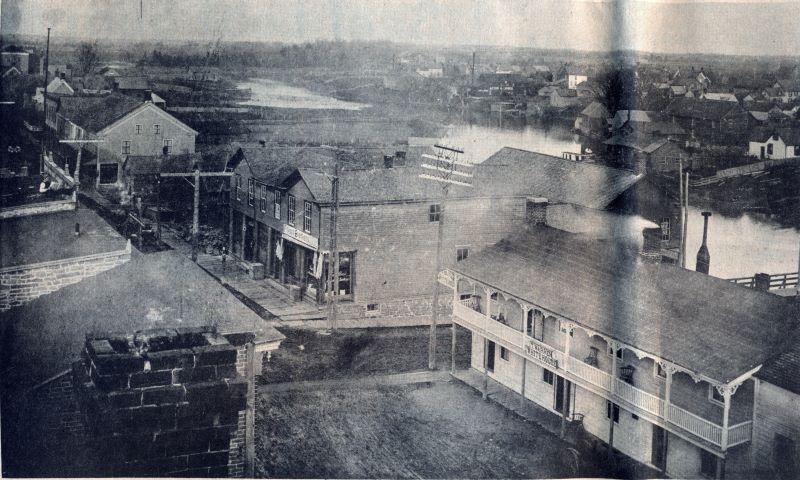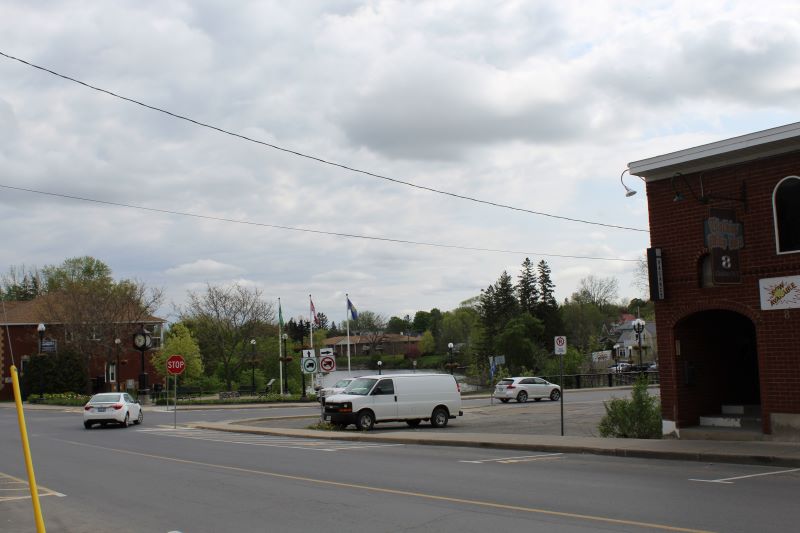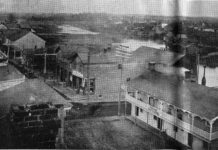North Grenville is full of empty spaces, if that isn’t a confusing concept. One of them is at the corner of Clothier and Prescott Streets, a junction that was once the vibrant centre of Kemptville’s business life. The White House Hotel was built by Nathaniel Fenton in the mid-1830’s. Fenton was also responsible for the fine building on the north-west corner of Clothier and Rideau streets, and was an important individual in the business life of Kemptville for many years. A map of 1861-62 indicates that the Hotel was then called Rideau House.

Nathaniel Fenton had a secret part of his life as a respectable hotel-keeper in Kemptville. He also a member of the underground Hunters Lodges, a republican group dedicated to rebellion in Canada and followers of William Lyon MacKenzie. The Hunters Lodges continued to make occasional raids into Canada from the United States even after the failure of MacKenzie’s 1837 Rebellion.
An informer led to the dispersal of the Kemptville Lodge, although Fenton returned in a short time to carry on his life in the community. He was, it seems, the big winner in the entire affair. Now that the Hunters Lodge was defunct and the members could not identify themselves without facing the consequences, it seems their Treasurer, Nathaniel himself, decided to spend the funds raised by the Lodge on a big new stone house for himself. It still stands at the corner of Clothier and Rideau, and Fenton continued to live there until his death in 1849. Ironically, the house built by the funds of a republican secret society of rebels later became the home of a Conservative Member of Parliament, Dr. Charles Ferguson, and the boyhood home of a future Conservative Ontario Premier, G. Howard Ferguson.


Thomas Adams bought the hotel in 1865 and maintained it until 1881. To attract business to his establishment, Thomas ran a free shuttle service between his hotel and the railway station at Bedell for visitors and travelling salesmen. Thomas Warren, whose name appears on the sign in the photograph, owned it from 1881 until 1928. One of the first buildings in town to be heated by furnace and lit by electricity, it also had large carriage and livery barns in the rear, with power generated by two windmills. This establishment took up the entire block from Clothier Street to the river.
A description of the hotel in 1903 emphasises both its size and importance: “This is another house that can lay claim to some considerable ancient history. The hotel is largely patronized by travelers and by farmers while in town with their produce. It is furnace heated, lighted by electricity and provided with a dining room whose tables are second to none in the town.
There is connected to the hotel one of the finest hotel and livery barns in this part of the province. It is constructed of heavy frame work 100×50 covered with iron, is provided with two windmills and everything that could add to the comfort and convenience of the horse. Large, airy stables, fine carriage and harness rooms and in short everything that could go to complete a model hotel and livery barn.”
The large stables built to the water’s edge described in this report were built on the site of the woolen mill formerly owned by George Keating, another of the early entrepreneurs of Kemptville. In 1888, Keating ran wires from his mill down to the Oddfellows Hall on Clothier Street East, supplying electric light for an Agricultural Fair.
Business declined over the years, along with the economy of Kemptville, and the hotel was finally demolished in 1928 and replaced by a service station, with the old livery building used as a receiving, grading, and shipping station by Oxford-on-Rideau Egg Producers. Under various names – the McColl-Frontenac Station, the Red Indian Service Station, and the Texaco Service Station – it operated under many owners until it closed in 1985. Herbert Hunter, an retired OPP officer, operated the McColl-Frontenac Station, and when it switched to being the Texaco Service Station, Gerald Cater, Albert Cater and Doug Somerville ran it.
Today, there is little to show that this corner lot was once a thriving and prosperous hotel, catering to hundreds of visitors and commercial business people for more than a century.






